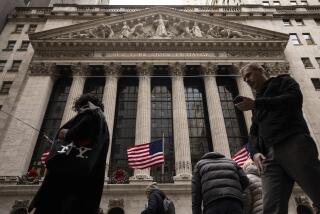Economists Say Recession Ended in 2nd Quarter
- Share via
Nearly 80% of the nation’s top business forecasters think the recession ended in the second quarter of 1991, and only 11% said there is a better-than-even chance of the economy again slipping into a recession sometime over the next 12 months, according to a survey to be released today.
But virtually all of those questioned by the National Assn. of Business Economists believe that the recovery will be anemic by historical standards and that the gross national product will grow only 2.5% to 3% over the next year--well below the 4% to 5% registered in the climb out of previous recessions.
NABE members who were polled for the group’s economic snapshot include staff economists among the country’s major corporations, banks and business agencies. The organization is meeting in Los Angeles for its annual convention, which began Sunday.
“The consensus view is that the recovery began in the late spring or early summer,” said Fred Breimyer, president of the Northeast Economic Project, a Boston-based regional forecasting firm.
“But it has been modest by historical standards. . . . If the test of recovery is feeling better, then this is not a recovery. We have an end of decline, but not the beginning of rapid growth,” he said.
Economists blamed the abnormally slow recovery on restrictive monetary policy, higher consumer debt load and tight governmental fiscal policy at both the national and state levels. Most of the economists surveyed did not think international developments such as a stronger dollar or slower overseas growth would have much of an impact on the recovery.
The NABE survey was based on forecasts made by a panel of 56 professional economists, as well as a survey of 256 NABE members on economic policy.
The survey echoes comments made Sunday by White House Budget Director Richard Darman on ABC’s “This Week with David Brinkley.” Darman said the White House believes the recovery began in May, but admitted, “It’s not coming up as strongly as we would want.”
Charles E. Devlin, a financial analyst with the Pittsburgh, Pa.-based utility Duquesne Light, said he expects that third-quarter GNP numbers will “show growth” and that the revised second quarter numbers, which are due out this week, will be upgraded from the original 0.1% decline.
“I’m less concerned about the second half of this year than I was before,” Devlin said.
Several of the economists attending this week’s NABE convention said this year’s recession went beyond the traditional manufacturing sector and has heavily affected the service industries, giving rise to layoffs in such previously immune white-collar professions such as law, banking, financial services and advertising.
“Generally, service industries have struggled more than others,” said Dick Howard, a senior economist at Bank Julius Baer in London, which manages American pension funds and international bond portfolios.
Howard said that he foresees the manufacturing sector leading the way out of the recession, whereas consumers traditionally have been the first to rebound, by spending more on cars, major household items, clothes and vacations. But many consumers are still weighed down by personal debt and are in no mood for spending.
NABE economists expect the Consumer Price Index to rise only 3.7% on average in 1992, while Treasury bills are expected to go up 5.8%.
A full 75% of the economists believe the Federal Reserve will react to the pace of economic growth and 67% think the Fed will further ease credit (the survey was done before the Fed lowered its discount rate on Sept. 13). A slim majority (53%) believes monetary policy is “about right,” while 45% still believes the Fed has been too tight.
Although the economists say a recovery is under way nationally, the same is not true for Southern California, said Louis Cherene, a senior planner with the Southern California Rapid Transit District.
Cherene blames not only the cuts in defense spending but also long-term scale-backs in the electronics and aerospace industries, which in turn impact everything from real estate to retailing.
“I think (Southern California) is going to lag,” he said. “We are so growth-oriented. When that growth stops, we crash. It’s going to be the rest of the country that pulls us out. We were the only area in the country that did not have a recession in the last 10 years.”
More to Read
Inside the business of entertainment
The Wide Shot brings you news, analysis and insights on everything from streaming wars to production — and what it all means for the future.
You may occasionally receive promotional content from the Los Angeles Times.










